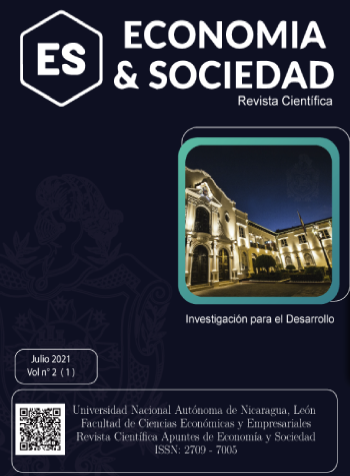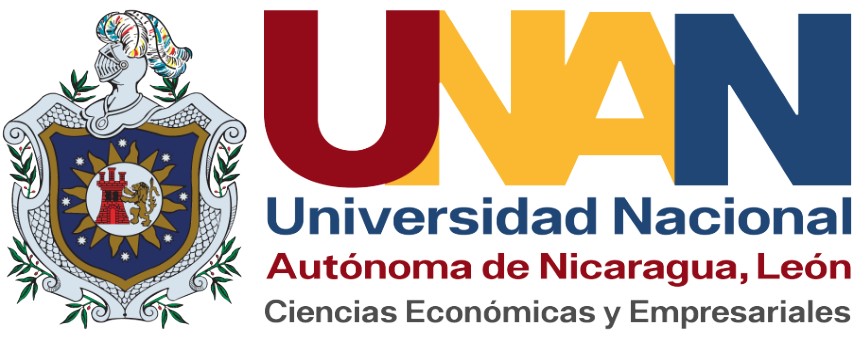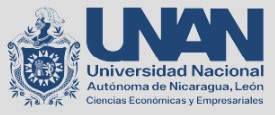Commercial activity in Nicaragua: An explanation of the remittances and investment
DOI:
https://doi.org/10.5377/aes.v2i1.12114Keywords:
commercial activity, gross investment, remittances, econometric modelAbstract
The commercial activity is of great importance for an economy, because through its development the goods and final products reach the consumers who seek the satisfaction of their needs. In Nicaragua, it ranks in second place in the Monthly Index of Economic Activity (IMAE), experiencing an interannual growth of 5.5% until 2020 and one of 4.9% in the Gross Domestic Product (GDP). The activity has experienced a growth despite social, political and health events, being considered in part an explanation that arises from the growth of family remittances received by Nicaraguans, as well as investment projects promoted by the public and private sectors. According to the economic theory of John Maynard Keynes, when households have higher disposable income, their purchase actions for consumption tend to increase as they seek to achieve higher living standards; At the same time, as investment projects become more dynamic, greater job opportunities are generated and, therefore, increases in income; that is why in this research a Log-Log econometric model is estimated to explain the production of commercial activity. The study has a quantitative approach, correlational scope and non-experimental design, secondary information sources are used, obtaining data from the website of the Central Bank of Nicaragua (BCN). The results reflect that, both the production of the commercial sector and remittances have experienced an increasing behavior in a series of 10 years, gross investment, although it has not been the exception, has been affected by the national context. There is a 98% explanation of the independent variables for the dependent variable, which allows to affirm that these are explanatory in the development of commercial activity, with a greater contribution from investment than remittances, but both with inelastic effects.
Downloads
References
BCN. (junio de 2013). Obtenido de https://www.bcn.gob.ni/publicaciones/metodologias/documentos/NM_Inversion_Extranjera_Directa.pdf
Cruz, J. (2018). Formalidad en el sector comercio crece en 70% en cinco años. FIN, pág. 1.
Delgado, M. J. (2014). J.M. Keynes: Crecimiento económico y distribución del ingreso. Revista de Economía Institucional, 160.
Figueroa Arreaga, W. T., y Rodríguez Calendario, R. S. (23 de Junio de 2017). Repositorio UG. Obtenido de http://repositorio.ug.edu.ec/bitstream/redug/20733/1/TESIS%20FIGUEROA%20ARREAGA%20WENDY%20Y%20RODRIGUEZ%20CANDELARIO%20ROCIO.pdf
Gujarati, D., y Porter, D. (2009). Econometría (5a edición). McGraw-Hill. Obtenido de https://www.academia.edu/33064534/Gujarati_Econometr%C3%ADa_5ta_Edici%C3%B3n_pdf
Hernández Sampieri, R., Fernández Collado, C., Baptista Lucio, P. (2014). Metodología de la investigación (6ta edición). En R. F. Hernández Sampieri, Metodología de la investigación (6ta edición). México D.F: McGraw Hill.
Keynes, J.M. (1976). La teoría general de la ocupación, el interés y el dinero. En J.M. Keynes, La teoría general de la ocupación, el interés y el dinero. México: Fondo de Cultura Económica.
Rodríguez, F. (2016). Nicaragua: Comercio crece con firmeza. Fashion Network, pág. 1.
SWI. (15 de enero de 2021). Swissinfo. Obtenido de https://www.swissinfo.ch/spa/nicaragua-remesas_nicaragua-capt%C3%B3-1.851-4-millones-de-d%C3%B3lares-en-remesas-en-2020--un-10---m%C3%A1s/46291536
Published
How to Cite
Issue
Section
License
Copyright (c) 2021 National Autonomous University of Nicaragua, UNAN León

This work is licensed under a Creative Commons Attribution-NonCommercial-ShareAlike 4.0 International License.














